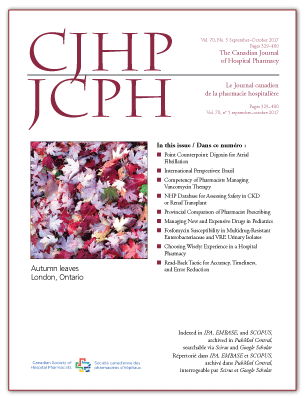Creation of a Natural Health Products Database for Assessing Safety for Patients with Chronic Kidney Disease or Renal Transplant
DOI:
https://doi.org/10.4212/cjhp.v70i5.1695Keywords:
herbal products, natural health products, chronic kidney disease, transplantation, dialysis, plantes médicinales, produits de santé naturels, insuffisance rénale chronique, greffe, dialyseAbstract
ABSTRACT
Introduction: There is a lack of published safety information on the use of natural health products (NHPs) for patients with chronic kidney disease (CKD) or renal transplant.
Objective: To create an online database to provide evidence-based safety recommendations for commonly used NHPs, specific to patients with CKD or renal transplant.
Methods: NHPs used by CKD and transplant patients in British Columbia were identified from the records of the BC Provincial Renal Agency. For each NHP, several databases (MEDLINE, Embase, Lexi-Natural Products, PubMed Dietary Supplement Subset, and Natural Medicines) were searched for any information pertaining to dosage, adverse drug reactions, drug interactions, immunomodulatory effects, and pharmacokinetics in patients with renal disease. Each NHP was given 1 of 4 safety ratings: likely safe, possibly safe, possibly unsafe, and likely unsafe. An NHP was classified as “possibly unsafe” for patients with renal transplant if it had demonstrated in vitro immunomodulatory effects and/or significant interactions with transplant medications due to effects on the cytochrome P450 3A4 isozyme.
Results: Of the 19 627 BC-registered patients with renal disease (as of August 2014), 4122 (21%) were using one or more NHPs. The Herbal-CKD website (www.herbalckd.com) was created in 2015 to provide information about 47 commonly used NHPs and 2 known nephrotoxins (aristolochic acid and silver). This website provides a systematic evaluation of safety information for selected NHPs for patients with CKD (both nondialysis and dialysis-dependent) and kidney transplant. The most common NHP safety classification was “possibly safe”, reflecting the paucity of studies in renal populations and the availability of safety data for the general population. Limitations of the website include difficulty in interpreting and generalizing the safety literature because most NHP formulations are not standardized, and others are combination products.
Conclusion: The website www.herbalckd.com provides an easy-to-use, evidence-based tool for health care professionals to assess the safety of NHPs for CKD and transplant patients.
RÉSUMÉ
Contexte : On observe qu’il n’existe que très peu d’information publiée sur l’innocuité des produits de santé naturels (PSN) pour les patients souffrant d’insuffisance rénale chronique ou ayant subi une greffe rénale.
Objectif : Créer une base de données en ligne qui sert à fournir des recommandations de sécurité fondées sur des données probantes au sujet des PSN les plus employés spécifiquement à l’intention des patients atteints d’insuffisance rénale chronique ou ayant subi une greffe rénale.
Méthodes : Les PSN utilisés par les patients souffrant d’insuffisance rénale chronique ou ayant subi une greffe rénale ont été répertoriés d’après les dossiers de la BC Provincial Renal Agency. Pour chaque PSN, plusieurs bases de données (MEDLINE, Embase, Lexi-Natural Products, PubMed Dietary Supplement Subset et Natural Medicines) ont été interrogées afin d’y chercher des informations sur la posologie, les réactions indésirables aux médicaments, les interactions médicamenteuses, les effets immunomodulateurs et la pharmacocinétique chez les patients atteints d’insuffisance rénale. Chaque PSN s’est vu attribuer l’un de quatre degrés de sécurité : probablement sécuritaire, possiblement sécuritaire, possiblement nocif et probablement nocif. Un PSN était classé « possiblement nocif » pour les patients ayant subi une greffe rénale s’il a manifesté in vitro des effets immunomodulateurs ou des interactions importantes avec les médicaments antirejet à cause de l’isozyme 3A4 du cytochrome P450.
Résultats : Parmi les 19 627 patients insuffisants rénaux inscrits en Colombie-Britannique, 4 122 (21 %) utilisaient au moins un PSN (en date d’août 2014). Le site Web HerbalCKD (www.herbalckd.com) a été créé en 2015 afin de fournir de l’information sur 47 des PSN les plus utilisés et sur deux néphrotoxines connues (l’acide aristolochique et l’argent). Ce site Web offre une évaluation systématique des informations sur l’innocuité de PSN choisis qui pourraient être utilisés par les patients souffrant d’insuffisance rénale chronique (dialysés ou non) ou ayant subi une greffe rénale. Les PSN étaient le plus souvent classés sous « possiblement sécuritaire », ce qui souligne le peu d’études auprès des populations souffrant de troubles rénaux et la disponibilité de données sur l’innocuité dans la population générale. Parmi les limites du site Web, on compte la difficulté à interpréter et à généraliser la littérature sur l’innocuité parce que la plupart des formules de PSN ne sont pas normalisées et que certains PSN sont un mélange de substances.
Conclusion : Le site Web www.herbalckd.com représente pour les professionnels de la santé un outil simple et fondé sur des données probantes leur permettant d’évaluer l’innocuité de PSN pour les patients atteints d’insuffisance rénale chronique ou ayant subi une greffe rénale.
Downloads
Published
Issue
Section
License
Copyright © Canadian Society of Healthcare-Systems Pharmacy.
After publication of a manuscript in the CJHP, the authors of the manuscript must obtain written permission from the CSHP (publications@cshp.ca) before reproducing any text, figures, tables, or illustrations from the work in future works of their own. If a submitted manuscript is declined for publication in the CJHP, all said rights shall revert to the authors. Please note that any forms (e.g., preprinted orders and patient intake forms) used by a specific hospital or other health care facility and included as illustrative material with a manuscript are exempt from this copyright transfer. The CJHP will require a letter from the hospital or health care facility granting permission to publish the document(s).










